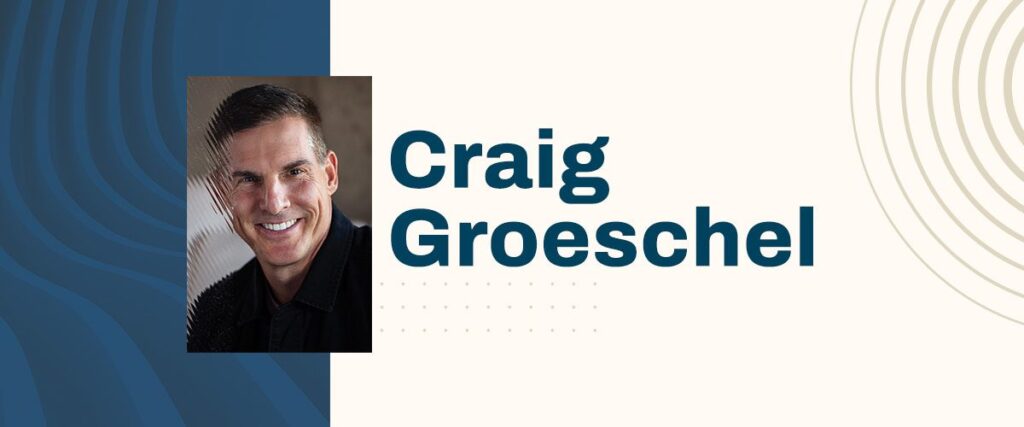Creating an irresistible winning culture is part of what Craig Groeschel does best. As the senior pastor and leader of Life.Church, Craig has led his team in such a way that has made his church Glassdoor’s #1 Best Place to Work for Small and Medium-Sized Businesses in North America in 2021.
In his talk at The Global Leadership Summit coming up in August 2022, we’re excited to learn from Craig on the four elusive, often intangible leadership qualities that draw people in and impact a whole team and culture for the better.
Get your tickets today, and until then, enjoy a taste of Craig’s insights from a podcast conversation he had with Albert Tate on the tools Life.Church uses to build and protect its culture. From developing effective and inspirational values, to the critical role of feedback, discover how to create an irresistible winning culture. Listen >>
5 Ways to Create an Irresistible Winning Culture
1. Recognize strength.
Craig Groeschel reminds us that the potential of an organization rests on the strengths of its people. To realize this potential, Craig says he surrounds himself with people who have strengths he doesn’t have. “Our church is 25 years old,” says Craig. “Our leadership team has been together for 23 of those years, meaning it took me a couple years to assemble them. But they have stayed for over two decades. The people around me are the best of the best. We grew together and we helped each other get better. I always tell our team the potential of your organization always rests on the strength of its people. They better be better than you because you’re not good in every way.”
How do you get a strong team? It doesn’t happen overnight. Building a strong team starts with building a strong culture of leadership and feedback.
2. Don’t build programs, create culture.
Craig says programs come and programs go, so it’s important to instead focus on creating a leadership culture. “I’ve got a team of people that specialize in culture,” says Craig. “They wake up every day asking, how can we make this the most special place to work? If we’re going to build talent, create talent, retain talent, we want them to love it here, not just like it. Then I’ve got a whole team of staff that are culture creators. We’re not creating a program. We’re creating a culture.”
What we’ve done is created a culture where the day you walk in the door, you’re being developed…
To build this culture, Life.Church has instilled different types of leadership mentoring woven deep into their culture. It’s so woven into the culture, in fact, when Craig asks his staff about the number one thing that surprises them about the organization, their top two answers are the same—leadership development and feedback. “Leadership development and feedback are actually the same thing,” says Craig. “What we’ve done is created a culture where the day you walk in the door, you’re being developed. How do you find great world class leaders? The answer is you do not find them, you build them.”
Craig also reminds us that culture is a combination of what you create and what you allow. It also doesn’t happen by accident. “We’re creating the environment,” Craig continues. “If we have a bad culture, it’s because we’ve tolerated it. If we want something different, we’re going to create something different now. You can never become healthy by accident.”
3. Leverage your values.
Craig says it’s important that values aren’t just a list of words; values should move people emotionally. Noting two different kinds of values—core values and behavioral values, Craig shows us how core values move people, and behavioral values identify what already exists on your team. Core values are going to be things like integrity, passion, vision,” said Craig. “In my opinion, those words are stupid. They may be good words, but they don’t create any emotion and they don’t create any movement. So, let’s say we value evangelism (if you’re not a church person, that means reaching people that aren’t church people and bringing them to faith). Saying we value evangelism means nothing. Instead, we say we’ll do anything short of sin to reach people who don’t know Christ. That’s memorable. You can feel something if I say that and tell a story. You’re going to buy in.
We don’t find great leaders, we build them.
“Then there’s behavioral values. There are things we believe and there are ways we behave. What I would suggest you do if you want to determine your behavioral values—don’t make them up, identify what’s already there. Take your top team members, your top employees, whatever they are, and ask yourself what do they have in common? We did this with our top ones and came up with work ethic, flexibility, teach ability, humility, and integrity.
“You can be really smart but not have a work ethic. You can be really creative, but you could not be teachable, not be humble. I’d rather have someone who’s humble who can grow than someone who’s smart and arrogant. So, we’re looking for these different types of values. Then we’re bringing in the people that have the right DNA. Give me someone with our values that can become great. We don’t find great leaders, we build them. That’s how you build a special organization.”
4. Develop leaders with feedback.
In Craig’s church, he believes leadership development and feedback work together. When feedback is motivated by love, it can be an incredibly powerful tool to help leaders grow and develop. “We want to create a culture of people who crave, love, and value feedback,” says Craig. “What we want to know is, do you love someone enough and care enough to tell them the truth?
Craig is the first to lead by example in the area of feedback. “The whole organization knows I get feedback,” says Craig. “I have to receive it. I have to apply it. I have to model it. If I don’t, they won’t. It starts with the top leader. Then you want it to go all the way through your organization to where you don’t want to do anything without feedback.”
What we want to know is, do you love someone enough and care enough to tell them the truth?
In a culture that values feedback motivated by love, growth permeates throughout the organization. “When you love somebody, you tell them the truth to help them get better,” says Craig. “We need leadership driven by love. If you’re not driven by love, you’re not going to have the conviction in the burden to say the hard things that may push you back a little bit. But you know the long run, it’s going to push you forward.”
Albert Tate adds to the conversation the power of getting uncomfortable and awkward. “We’ve got to get over this thing where nobody wants to be awkward,” says Albert. “There are going to be awkward moments, but people avoid awkward like the plague. Nobody ever died over awkward. But I think we fear awkward more than we have a conviction for love. And what I’m hearing you saying is, as you push your pastors, as you push your leaders, and as you give feedback, it’s driven by love.”
It’s about being uncomfortable enough to love others. Ultimately, leadership is about others, which brings us to the final point in the conversation with Craig—you-based leadership.
5. Commit to “you-based” leadership.
Craig says it’s important to make your leadership about those you lead, not about yourself. The most important thing to do as a leader is empower others, get out of their way, and commit to helping them be the best possible version of themselves.
In fact, Craig mentions how in the last two decades, he’s only had two people leave out of the top 100+ leaders on his team, and not because they joined other churches. If trust is the foundation, there is trust enough to build something beautiful together, and trust enough to be able to leave well. “We create an environment where their role is special,” says Craig. “The best thing I do is what I don’t do. I don’t get in their way. It’s you-based leadership. You can say it, or you can believe it. If you believe it, they’ll feel it. If they feel it, you’ll do special things together.”







